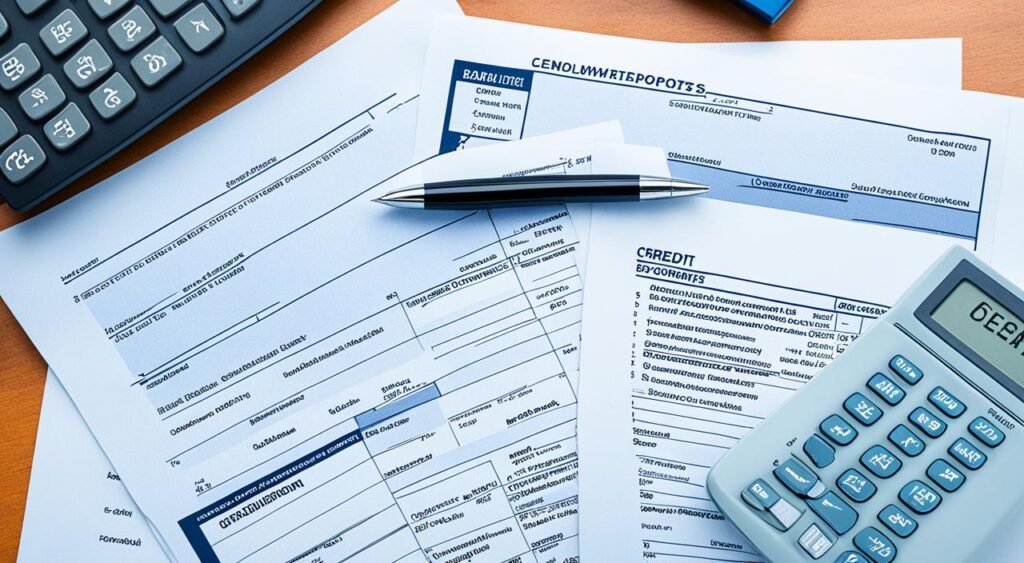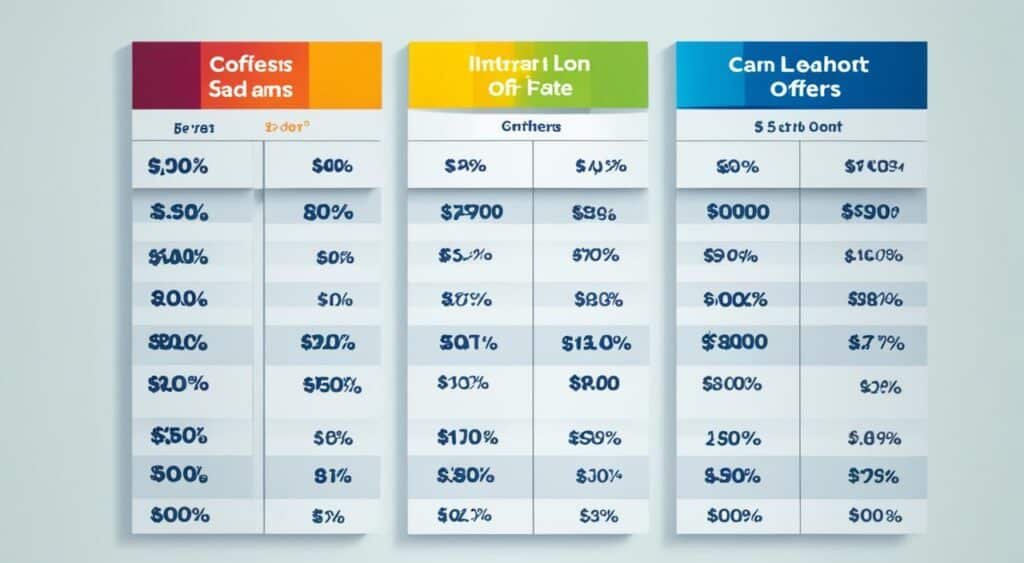What Factors Affect Car Loan Approval?
Getting a car loan is a big step in buying a car, but it’s not always easy. Knowing what lenders look at when they check your loan application can help you. This article will cover the main things that affect car loan approval. We’ll talk about your credit score, debt-to-income ratio, the car’s value, and your job history.
Key Takeaways
- Your credit score is the main thing lenders look at when they check your car loan application.
- Debt-to-income ratio, job stability, and the size of your down payment are also key in the approval process.
- The loan amount and the car’s value matter a lot to lenders. They look at the risk and the car as collateral.
- Knowing how lenders check your application can help you make a strong loan application. This can boost your chances of getting approved.
- Whether the car is new or used can also affect your financing options and the terms you get.
Understanding Car Loan Approval
Getting a car loan is a big step in buying a car. Knowing what lenders look at when they decide on a loan can make things easier. Your credit score, debt-to-income ratio, loan amount, and the car’s value all matter a lot.
Lenders really focus on your credit score. This score shows how well you handle debt. A higher score means you might get better rates and terms on your loan.
They also look at your debt-to-income ratio. This ratio compares your debt payments to your income. A lower ratio shows you can handle more debt, like a car loan.
The loan amount and the vehicle’s value are key too. Lenders like to approve loans that match the car’s value. This makes sure they have something valuable if you can’t pay back the loan.
Other things matter too, like your job history and income stability. And the size of your down payment. Lenders want borrowers with steady jobs and stable incomes. A bigger down payment shows you’re serious about buying the car, which can help you get approved.
Knowing these factors can help you get ready for the loan process. It can also increase your chances of getting good loan terms.
“Securing a car loan is a crucial step in the car-buying process, and understanding the factors that lenders consider can help you navigate the process more effectively.”
Your Credit Score: The Key Factor

Your credit score is the most crucial factor when applying for a car loan. Lenders use this number to see if you can pay back the loan. Knowing how credit scores work and their impact on your loan can help you in buying a car.
Credit Score Ranges and Loan Qualification
Credit scores go from 300 to 850, with higher scores meaning you’re less of a risk. A higher score means you’re more likely to get a car loan with good interest rates. Here’s how different credit scores can affect your loan:
- Excellent credit (760-850): If you have an excellent score, you’re often pre-approved for loans. You’ll get the best rates and terms.
- Good credit (700-759): With good credit, you’re seen as low-risk. You can get competitive loan offers.
- Fair credit (640-699): You can still get a car loan with fair credit. But, you might pay higher interest or need a bigger down payment.
- Poor credit (below 640): Getting a car loan with poor credit is harder. You might only get subprime financing, which has high interest rates and tough terms.
Remember, different lenders have their own credit score needs for loans. Some may require a minimum score. A soft credit check (which doesn’t affect your score) can show you your credit status before you apply for a car loan.
Debt-to-Income Ratio: Balancing Income and Liabilities

Getting a car loan? Lenders check your debt-to-income (DTI) ratio. This shows if you can handle your loan payments with your income and debts.
Your DTI ratio is your total monthly debt payments divided by your gross monthly income. Lenders want this ratio to be 43% or less. This means you have enough income for your loan and other bills.
| Debt-to-Income Ratio | Loan Approval Likelihood |
|---|---|
| Less than 43% | High |
| 43% to 50% | Moderate |
| Over 50% | Low |
To find your DTI ratio, add your monthly debts like credit cards and student loans. Then, divide this by your gross monthly income. This gives your DTI ratio, which lenders use to see how much loan you can handle.
Keeping a low DTI ratio is key when planning for a car loan. A lower ratio means you’re more likely to get the loan you need. It shows you can manage your finances well.
Lenders check if you can afford the loan. So, it’s crucial to keep your DTI ratio low. This is a big part of getting your car loan approved.
Employment and Income Stability

When applying for a car loan, your employment stability and income stability matter a lot. Lenders need to know you can pay back the loan on time. They look at your job history and how steady your income is.
Proving Your Ability to Repay the Loan
Lenders check your ability to repay the loan by asking for things like pay stubs and tax returns. They want to see you have a steady income that covers the monthly car loan payments. Having a stable job helps during the loan application and preapproval process.
Also, lenders like to see you manage money well. This means having a good credit score, a low debt-to-income ratio, and making payments on time. This can make them more likely to approve a preapproved loan for a car.
By showing you’re financially stable, you can boost your chances of getting a car loan. This lets you shop for a new car from the comfort of your home.
| Key Factors | How They Affect Loan Approval |
|---|---|
| Employment Stability | Lenders look for a steady income to cover the loan payments. |
| Income Stability | A steady income shows you can repay the loan and agree to be responsible. |
| Loan Application and Preapproval Process | Showing your income with documents like pay stubs can help you get approved for a preapproved loan to buy a car. |
“A stable job and consistent income are key factors that lenders consider when evaluating a car loan application. Demonstrating your financial responsibility can give you the loan you need to make your car buying process a smooth one.“
Down Payment: A Sign of Commitment

The down payment is key when applying for a car loan. It’s the money you pay upfront towards the car. This amount affects the loan size, interest rate, and terms.
A bigger down payment, usually 10% to 20% of the car’s value, shows you’re serious about buying. It means you’re putting your own money down. This can make lenders more likely to offer you better loan terms, like a lower interest rate or longer repayment.
Whether the car is new or used affects the down payment needed. For new cars, lenders usually want at least 10% down. For used cars, it’s often 20% or more. This shows lenders see used cars as riskier.
| Vehicle Type | Typical Down Payment |
|---|---|
| New Car | 10% or more |
| Used Car | 20% or more |
Putting down a lot of money upfront shows you’re ready for the car financing process. It’s key to getting a car loan and driving your new car home.
Loan Amount and Vehicle Value

Car loans depend on the loan amount and the vehicle value. Lenders look at the loan-to-value (LTV) ratio to understand the risk. This ratio helps them decide if a new or used vehicle is a good investment.
Lenders’ Perspective on Risk and Collateral
Lenders focus on the vehicle’s value because it’s the loan’s security. They make sure the loan amount doesn’t go over the vehicle value. This prevents them from losing money if the borrower can’t pay back the loan. Each lender has a top LTV ratio they accept, which depends on the type of vehicle.
For new car loans, lenders might give more money compared to the vehicle value. New cars usually keep their value well. On the other hand, for used vehicle loans, lenders are more cautious. They limit the loan amount to a smaller part of the vehicle value.
The loan amount and vehicle value are key in the lender’s risk assessment. By looking at these, lenders try to balance offering affordable loans and protecting their money.
Car Loan Approval: The Lender’s Evaluation Process

Getting a car loan means knowing how lenders check if you’re a good candidate. They look at many things to see if you’re likely to pay back the loan. This helps them decide if they should approve your car loan.
Lenders really focus on your credit score. They check your borrowing history to see if you’ve been good with money. If your credit score is high, you’re more likely to get a car loan with good terms.
They also look at your debt-to-income ratio. This shows how much debt you have compared to your income. Lenders want to make sure you can handle the car loan payments without getting overwhelmed.
The amount you want to borrow and the car’s value matter too. Lenders like to lend money that matches the car’s worth. This makes the loan less risky for them.
Applying for preapproval is a smart move. It lets you get a conditional approval before you go to the dealership. This can help you negotiate better terms and get a good car loan deal.
Knowing how lenders evaluate you can help you improve your chances of getting a car loan. It lets you find financing that fits your budget and needs.
New vs. Used Vehicle Financing

Choosing between a new or used car affects the loan process a lot. It’s important to know the differences between financing a new and a used vehicle. This helps borrowers make a smart choice.
Financing a New Car
Buying a new car means getting a manufacturer’s warranty and the latest tech. But, new vehicles usually cost more, so the loan amount is bigger. Lenders might ask for a bigger down payment. They offer lower interest rates and APR because the car’s value is higher and it doesn’t depreciate as much.
Financing a Used Car
Choosing a used car can make loans cheaper and payments smaller. But, the loan amount and the car’s value are lower. Lenders might ask for a smaller down payment. It’s important to look at the interest rate and APR for used vehicle loans. These rates change based on the car’s age, mileage, and condition.
| Financing Factor | New Car | Used Car |
|---|---|---|
| Loan Amount | Higher | Lower |
| Down Payment | Larger | Smaller |
| Interest Rate | Lower | Higher |
| APR | Lower | Higher |
| Loan Term | Longer | Shorter |
| Monthly Payment | Higher | Lower |
The choice between new or used vehicle financing depends on your budget and needs. Knowing the factors involved helps borrowers make a choice that fits their financial goals.
Shopping for the Best Rates and Terms

Looking for the best car loan deal means shopping around. Compare loan offers from different banks and credit unions. This way, you can find the best interest rates, loan terms, and monthly payments for your budget.
Begin by checking out online car buying services and auto loan offers from various lenders. This helps you see the APR and loan term options. Keep in mind, the rates without your details may differ based on your loan experience and credit score.
After finding some promising loan offers, get in touch with the lender. Share your personal and financial details to get a precise estimate of your monthly car payment. This lets you see the real cost of each auto loan. Then, you can make a well-informed choice.
| Lender | Interest Rate | Loan Term | Monthly Payment |
|---|---|---|---|
| Bank A | 4.99% | 60 months | $450 |
| Credit Union B | 3.75% | 48 months | $425 |
| Online Lender C | 5.25% | 72 months | $375 |
The auto loan rates and terms may vary based on your credit score, down payment, and the car you want. A good loan experience can lead you to the car loan that can help you afford the car you want. get a preapproved car loan or auto loan preapproval calculator bank of america auto financing car loan preapproval with credit report, hard credit and get dealerships, car shopping subject to change annual percentage rate.
Also Read: What Are The Requirements For A Car Loan?
Conclusion
We’ve looked at what affects car loan approval, like your credit score and debt-to-income ratio. We also talked about the role of steady employment and how lenders review your application. Knowing these things can help you get better car loan terms.
When looking at new or used cars, check your finances and look into preapproval. This helps you find the best interest rates and loan terms. Doing this can save you time and money at the dealership. It also lets you make a choice that fits your budget and financial plans.
Getting ready and understanding what lenders want is key to a good car loan experience. Show that you’re creditworthy, have a steady income, and are serious about buying a car. This way, you can go through the car buying process with confidence and get the car you want.
FAQs
Q: What is a preapproved auto loan?
A: A preapproved auto loan is a loan offer from a lender that has already determined the loan amount you are eligible for based on factors such as credit history, income, and debt-to-income ratio.
Q: How can I get preapproved for a car loan?
A: To get preapproved for a car loan, you can apply online or visit a bank, credit union, or online lender. You will need to provide personal and financial information for the lender to assess your creditworthiness.
Q: What factors affect car loan approval?
A: Factors that can affect car loan approval include your credit history, income, debt-to-income ratio, employment status, loan amount, loan term length, and the lender’s specific credit requirements.
Q: Why should I get preapproved for a car loan?
A: Getting preapproved for a car loan can help you determine how much you can afford to spend on a car, save time at the dealership by knowing your budget, and give you negotiating power with the dealer.
Q: What is the difference between a loan preapproval vs. loan pre-approval?
A: There is no difference between “loan preapproval” and “loan pre-approval.” Both terms refer to the process of a lender reviewing your financial information and creditworthiness to determine if you qualify for a loan.
Q: Can I get preapproved for a car loan with bad credit?
A: While it may be more challenging to get preapproved for a car loan with bad credit, there are lenders who specialize in offering auto loans to individuals with less-than-perfect credit histories.
Q: What should I do if I get denied for a preapproved car loan?
A: If you are denied for a preapproved car loan, you should review the reasons for denial, work on improving your credit score, consider applying with different lenders, or explore other financing options such as a cosigner.
